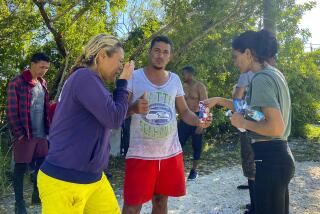Cuba Using Spies to Foil Refugee Exits : Asylum: Half of the Cubans recently seeking sanctuary in foreign embassies are government agents, envoys say. Their aim is to prevent escapes.
- Share via
HAVANA — At least half of the Cubans who have sought refuge in foreign embassies here during the last two weeks have been government agents deliberately planted to intimidate diplomats and thwart escape attempts by genuine asylum seekers, foreign diplomats said here Monday.
“It is widely believed in the diplomatic community that at least 14 of the asylum seekers who were in the Czechoslovak Embassy last week and nine of the 18 now in the Spanish Embassy were sent with the knowledge of the Cuban Ministry of Interior,” one Western diplomat said.
Three more asylum seekers vaulted over a wall of the Swiss Embassy on Sunday afternoon. With four others already sheltered at the home of the Italian ambassador, the latest defectors bring to 25 the number now under protection in the diplomatic missions of Spain, Italy and Switzerland.
Nineteen others who had been in the Czechoslovak Embassy since July 9 surrendered to Cuban authorities last week.
Diplomats said the latest three probably are genuine refugees. The Swiss Embassy had been only lightly guarded until Sunday afternoon, when the trio entered it, although it has since been cordoned off under heavy police guard.
But in the cases of the Czechoslovak and Spanish embassies, many of the presumed asylum seekers had to penetrate heavy rings of Interior Ministry police, strongly suggesting that they did so with police collaboration, said two foreign diplomats who spoke on condition that their names and nationalities be withheld.
One Western diplomat said he believes that even the first refugees who entered the Czechoslovak Embassy to spark the crisis earlier this month may have been bogus--or at the very least were operating with the knowledge of the Interior Ministry.
“The ministry was quite aware of it, and if it didn’t manipulate the whole thing, it acquiesced,” the diplomat said. “Castro wanted to give a black eye to (Czech President) Vaclav Havel after their bitter exchange of letters.”
Havel had written Castro last month urging the “immediate release” of dissident human rights activists who he complained have been unjustly jailed. The Cuban president replied angrily, criticizing Havel for what he called interference in internal Cuban affairs.
The crisis intensified when one of the original Czechoslovak asylum seekers, Lazaro Angel Cabrera, went on what appeared to be a clearly rehearsed TV program in Havana last Thursday to claim that diplomats of the United States, West Germany and Czechoslovakia had lured him and others into the escapade.
All three countries dismissed Cabrera’s charge as “completely absurd.”
A diplomat said he believes that the government of Fidel Castro was motivated by fear of a genuine flood of asylum seekers, as happened when Czechoslovakia began its “velvet revolution” last year and more recently when thousands sought refuge in Albania.
Seven of the refugees in the Czechoslovak Embassy took diplomats hostage, then trashed the house of an embassy officer. The Czechoslovaks said all seven appeared to have been trained in the martial arts.
Similarly, the Spanish Embassy described the nine most recent of its refugees as “fit and strongly built.”
A spokesman for the Spanish Embassy, which has been cordoned off and isolated by scores of Interior Ministry police, said five members of an elite Spanish police unit arrived Monday to bolster four already here who are keeping watch on the nine suspect asylum seekers. He said the most recent nine have been kept apart from the original nine refugees, who may be genuine asylum seekers.
More to Read
Sign up for Essential California
The most important California stories and recommendations in your inbox every morning.
You may occasionally receive promotional content from the Los Angeles Times.










